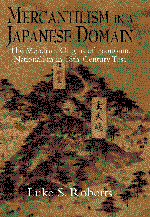Crossref Citations
This Book has been
cited by the following publications. This list is generated based on data provided by Crossref.
Walker, Brett L.
2001.
Commercial Growth and Environmental Change in Early Modern Japan: Hachinohe's Wild Boar Famine of 1749.
The Journal of Asian Studies,
Vol. 60,
Issue. 2,
p.
329.
Grabowski, Richard
2002.
Constructing National Economic Interests.
Journal of the Asia Pacific Economy,
Vol. 7,
Issue. 3,
p.
310.
Francks, Penelope
2002.
Rural Industry, Growth Linkages, and Economic Development in Nineteenth-Century Japan.
The Journal of Asian Studies,
Vol. 61,
Issue. 1,
p.
33.
FRANCKS, PENELOPE
2005.
Multiple Choices: Rural Household Diversification and Japan's Path to Industrialization.
Journal of Agrarian Change,
Vol. 5,
Issue. 4,
p.
451.
Sagers, John H.
2006.
Origins of Japanese Wealth and Power.
p.
1.
Sagers, John H.
2006.
Origins of Japanese Wealth and Power.
p.
9.
Brown, Philip C.
2006.
Arable Land as Commons.
Social Science History,
Vol. 30,
Issue. 3,
p.
431.
Maddison, Angus
2006.
Asia in the World Economy 1500–2030 AD.
Asian-Pacific Economic Literature,
Vol. 20,
Issue. 2,
p.
1.
Francks, Penelope
2009.
Inconspicuous Consumption: Sake, Beer, and the Birth of the Consumer in Japan.
The Journal of Asian Studies,
Vol. 68,
Issue. 1,
p.
135.
2009.
Strange Parallels.
p.
371.
Hurth, Pascal
2010.
Entre acceptation et refus.
Histoire & Sociétés Rurales,
Vol. Vol. 32,
Issue. 2,
p.
109.
Francks, Penelope
2013.
Simple pleasures: food consumption in Japan and the global comparison of living standards.
Journal of Global History,
Vol. 8,
Issue. 1,
p.
95.
Marcon, Federico
2014.
Satō Nobuhiro and the Political Economy of Natural History in Nineteenth-Century Japan.
Japanese Studies,
Vol. 34,
Issue. 3,
p.
265.
Spafford, David
2014.
Emperor and Shogun, Pope and King: The Development of Japan's Warrior Aristocracy.
Bulletin of the Detroit Institute of Arts,
Vol. 88,
Issue. 1-4,
p.
10.
Cohen, Mark
2014.
The political process of the revolutionary samurai: a comparative reconsideration of Japan’s Meiji Restoration.
Theory and Society,
Vol. 43,
Issue. 2,
p.
139.
Cohen, Mark
2015.
Historical Sociology’s Puzzle of the Missing Transitions.
American Sociological Review,
Vol. 80,
Issue. 3,
p.
603.
Francks, Penelope
2016.
Japan and the Great Divergence.
p.
79.
BOYLE, Edward
2016.
Imperial Practice and the Making of Modern Japan's Territory: Towards a Reconsideration of Empire’s Boundaries.
Geographical review of Japan series B,
Vol. 88,
Issue. 2,
p.
66.
Burguière, Frédéric
2016.
La naissance des cultures d’entreprises au Japon. Ethique et commerce à l’époque d’Edo.
Revue de géographie historique,
Ota, Ariko
2017.
PORCELAIN AND POWER: COMPARATIVE REGIONAL ANALYSIS OF INDUSTRIAL MANUFACTURING IN TOKUGAWA JAPAN.
International Journal of Asian Studies,
Vol. 14,
Issue. 1,
p.
27.





